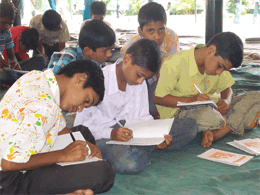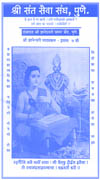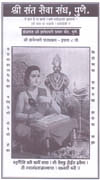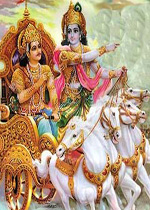Grantharaj Shree Dnyaneshwari Pathyakram
The first academic activity in Maharashtra based on Dnyaneshwari

In order to carry the essence of Geeta & Dnyaneshwari among youngsters at an appropriate age, Shree Sant Seva Sangha introduced the first scholastic activity in Maharashtra named 'Dnyaneshwari Paathyakram'.
We conduct the examinations for students from standards 6 to 9. Every student who passes this exam, receives a certificate and a few students who excel, are rewarded with a free residential camp. Every year, approximately 15,000 students take this examination. Till date, around 10,000 students have had the opportunity to be a part of the camps.
We conduct the examinations for students from standards 6 to 9. Every student who passes this exam, receives a certificate and a few students who excel, are rewarded with a free residential camp. Every year, approximately 15,000 students take this examination. Till date, around 10,000 students have had the opportunity to be a part of the camps.
Significance
Sant ShreeDnyaneshwar Maharaj and his divine book Grantharaj ShreeDnyaneshwari (composed at a tender age of 16) are being greatly honoured for the past 700 years. The contemporary society ostracized him and his shelterless siblings Nivruttinath, Sopandev and Muktabai and tortured them. But still by leading a principled life with an extremely stable and calm mind, Dnyaneshwar Maharaj always bestowed love upon the society and set an example of absolute saintism.
In Dnyaneshwari or any of Sant Dnyaneshwar Maharaj’s literary works, we do not come across even a slightest mention of the way the society treated him. On the contrary, he appeals to the Almighty to grant aatmadaan (the gift to free the entire mankind from all kinds of sorrows) through Pasaydan, the universal prayer.
All the saints, right from Sant Namdev, Sant Chokhamela to Sant Tukaram have considered Dnyaneshwar Maharaj as their Guru and so the society gave him a place of Mauli (mother) in their hearts. The saints persistently re-estabiish and spread knowledge and release us from the clutches of foreign invasions, rituals, impure penance and dominance of a specific class of society, and mould our lives according to the principles from Geeta. These saints are our idols.
Granthi means a knot. Granthasare the books which rescue us from all the sorrows by giving eternal happiness and make us fearless, doubtless and content. Only these thoughts from granthas have the ability to develop the human life completely. And so, not the books of miracles (pothi) but the books imparting the divine thought of saints and self knowledge (granthas) are necessary for every human being while ShreeDnyaneshwari is the sovereign of such Granthas. Grantharaj ShreeDnyaneshwari is the ultimate expression of spirituality! And so, the establishment of 'Grantharaj Shree Dnyaneshwari Pathyakrama'.
Objective
Through this syllabus, we have tried to convey the divine thoughts from Grantharaj ShreeDnyaneshwari through some selective topics and couplets.
Let the students learn profusely and prosper in life. But, along with this, let them also attain the knowledge from Dnyaneshwari at the right age in order to lead a flawless life. Then they will be the possessors of eternal happiness which would enable them to brighten and develop their personalities. The literature of our saints gives us this confidence. Moulding the tender minds of children with the thoughts of saints is the basic reason behind this activity.
Let the students learn profusely and prosper in life. But, along with this, let them also attain the knowledge from Dnyaneshwari at the right age in order to lead a flawless life. Then they will be the possessors of eternal happiness which would enable them to brighten and develop their personalities. The literature of our saints gives us this confidence. Moulding the tender minds of children with the thoughts of saints is the basic reason behind this activity.
Standard 7

Subject: Characteristics of a stoic (sthitapradnya)
Chapters from Geeta: 2
Geeta-Dnyaaneshwari is the knowledge of life. These two divine holy books teach us the way to live a happy and a successful life. Every person expects only happiness and success every moment. No one desires sorrows, but still most of the people are found unhappy, dissatisfied and cowardly. Many people not knowing what to achieve in life, gain sorrows. Due to the lust of achieving something, the mind is always unstable, confused and unwise. As a result a defeated mentality of committing suicide is formed. Unlike, a stoic is of a stable mind. But, in this society itself we experience that, The Saints living in extremely adverse conditions were always happy, content, complete and are the subject of respect and faith for many centuries.
Chapters from Geeta: 2
Geeta-Dnyaaneshwari is the knowledge of life. These two divine holy books teach us the way to live a happy and a successful life. Every person expects only happiness and success every moment. No one desires sorrows, but still most of the people are found unhappy, dissatisfied and cowardly. Many people not knowing what to achieve in life, gain sorrows. Due to the lust of achieving something, the mind is always unstable, confused and unwise. As a result a defeated mentality of committing suicide is formed. Unlike, a stoic is of a stable mind. But, in this society itself we experience that, The Saints living in extremely adverse conditions were always happy, content, complete and are the subject of respect and faith for many centuries.

That does not mean that there exists no happiness in life but we don’t have a proper vision to experience and achieve it. Everyone tries to achieve happiness by attaining fame, money, majesty but finally cannot procure happiness. Happiness does not depend upon the materialistic things but is present within us. Happiness depends on believing. The materialistic things which do not last forever can never give lasting happiness. For this, attaining the pleasantness of mind is necessary. This pleasantness can be achieved by the grace of The Saints and devotion towards The Almighty.
Everyone should get educated and try to achieve a different place in the society. But one should accept the truth that one would achieve everything as per his fate and should live life with complete satisfaction by serving The Saints and the society with complete dedication. This is the only path to eternal happiness. It is necessary to have a determined mind, devoted to The Almighty which is stable, pleasant and resolved in all conditions. The role of The Saints is 'Stoicism'. Every living being should strive hard to achieve this state through penance. Attaining the state of stoicism is possible only by the grace of THE SHREEGURU. Serving The Shreeguru physically and mentally and querying the pleased Shreeguru about salvation and moulding ourselves according to his advice by living a principled life can help us achieve 'Stoicism' and 'self realisation'.
Glossary:
1.Salvation- freedom from the cycle of life & death,
2.Shreeguru/ Sadguru- a teacher giving self-knowledge through spirituality.
Everyone should get educated and try to achieve a different place in the society. But one should accept the truth that one would achieve everything as per his fate and should live life with complete satisfaction by serving The Saints and the society with complete dedication. This is the only path to eternal happiness. It is necessary to have a determined mind, devoted to The Almighty which is stable, pleasant and resolved in all conditions. The role of The Saints is 'Stoicism'. Every living being should strive hard to achieve this state through penance. Attaining the state of stoicism is possible only by the grace of THE SHREEGURU. Serving The Shreeguru physically and mentally and querying the pleased Shreeguru about salvation and moulding ourselves according to his advice by living a principled life can help us achieve 'Stoicism' and 'self realisation'.
Glossary:
1.Salvation- freedom from the cycle of life & death,
2.Shreeguru/ Sadguru- a teacher giving self-knowledge through spirituality.
Standard 8

Subject: Swadharama & Kartavyanishta (Indiuvidual's duty & Dedication towards one's responsibility)
Chapters from Geeta: 3
The couplets from Chapter 3 of the Geeta given in this booklet describe a Karmayogi who performs his duties aptly. A person cannot escape deeds until he is alive. Everyone is enslaved by the prakriti hence cannot escape their daily deeds. Because, has breathing, seeing, walking stopped? The natural trait of the organs is to work. So freedom from the bonds of deeds takes place by performing the deeds aptly and not by escaping them. A situation faced should be properly thought upon and performed as per due responsibility suitable to the Varnaashrama. Brahmadev has told his subjects a path to happiness in verse10 of chapter 3. Brahmhadev said, instead of worshipping the gods and deities for the fulfillment of material expectations; one should perform his duties aptly. Because of which the gods will get satisfied with the 'Swadharma Yadnya'and fulfill your wishes. In this way, Brahmhadev associated the Dev Lok and Manushya Lok.
Chapters from Geeta: 3
The couplets from Chapter 3 of the Geeta given in this booklet describe a Karmayogi who performs his duties aptly. A person cannot escape deeds until he is alive. Everyone is enslaved by the prakriti hence cannot escape their daily deeds. Because, has breathing, seeing, walking stopped? The natural trait of the organs is to work. So freedom from the bonds of deeds takes place by performing the deeds aptly and not by escaping them. A situation faced should be properly thought upon and performed as per due responsibility suitable to the Varnaashrama. Brahmadev has told his subjects a path to happiness in verse10 of chapter 3. Brahmhadev said, instead of worshipping the gods and deities for the fulfillment of material expectations; one should perform his duties aptly. Because of which the gods will get satisfied with the 'Swadharma Yadnya'and fulfill your wishes. In this way, Brahmhadev associated the Dev Lok and Manushya Lok.

If we perform our duties aptly, selflessly and without any expectations and devote them to The Almighty, The Almighty will not only rescue us from the bonds of the deeds but also from the bonds of the cycle of life and death which is full of sorrows.
Glossary:
1. karma yogi- the unattached person who detaches his mind from the fruits of the deeds performance & makes all his senses perform their work only according to the principles of the saints is known as a karmayogi,
2.Varnaashrama- it is the division of work attitude in 4 categories. Every person while leading his life does all deeds by coming under the influence of these traits.
3. prakriti- nature,
4. devlok- the place of all the gods and deities,
5. manushya lok- a place of human beings / earth,
6. Swadharma Yadnya- a pledge of performing all the duties correctly with the required qualities at the required time and place.
Glossary:
1. karma yogi- the unattached person who detaches his mind from the fruits of the deeds performance & makes all his senses perform their work only according to the principles of the saints is known as a karmayogi,
2.Varnaashrama- it is the division of work attitude in 4 categories. Every person while leading his life does all deeds by coming under the influence of these traits.
3. prakriti- nature,
4. devlok- the place of all the gods and deities,
5. manushya lok- a place of human beings / earth,
6. Swadharma Yadnya- a pledge of performing all the duties correctly with the required qualities at the required time and place.
Standard 9

Subject: The real form of the almighty & Knowlede based devotion
Chapters from Geeta: 9 & 12
There is a significant importance for the 9th and 12th chapters of Geeta. Lord Krishna himself has openly described his cosmic, almighty, majestic form. So, even the Vedas were unable to describe the exact form of almighty. The Vedas were created from the breath of almighty and Geeta is actually told by The Lord himself. Lord Krishna (Almighty) has described the knowledge of his secret form openly in the 9th chapter, where as the 12th chapter highlights the alchemy of the devotee becoming The Almighty by telling the types of Dnyaanottar Bhakti depending upon the merit and the ability of every human being.
Chapters from Geeta: 9 & 12
There is a significant importance for the 9th and 12th chapters of Geeta. Lord Krishna himself has openly described his cosmic, almighty, majestic form. So, even the Vedas were unable to describe the exact form of almighty. The Vedas were created from the breath of almighty and Geeta is actually told by The Lord himself. Lord Krishna (Almighty) has described the knowledge of his secret form openly in the 9th chapter, where as the 12th chapter highlights the alchemy of the devotee becoming The Almighty by telling the types of Dnyaanottar Bhakti depending upon the merit and the ability of every human being.

Hence the 9th and the 12th chapters have a significant importance. The Waarkari Sampradaaya considers these chapters as their daily worship. Shree Geeta tells – "Everything, from Lord Brahma to a dry straw, is mortal. Whom should we devote from the 33 crores gods and deities?" Is the one whom we worship, the Lord of all the gods, The Almighty, The Ruler, The Incarnate Form of Knowledge, The treasure of everything pure and holy, The ultimate uestination for eternal happiness?? Is he capable of rescuing us from all the pains and sorrows, by destroying the darkness of ignorance? All these doubts get cleared in chapter 9. This booklet describes the cosmic form of almighty and the importance of the Bhakti Maarga.


